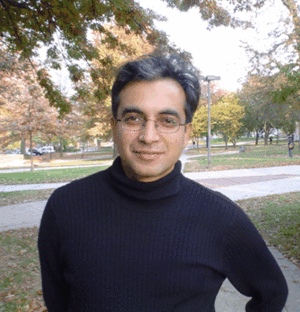The Nobleness of Life is to do Thus
A tribute to Omar Azfar by Azra Raza, M.D. being re-posted on his third death anniversary
 There’s a special providence in the fall of a sparrow. If it be now, ’t is not to come; if it be not to come, it will be now; if it be not now, yet it will come: the readiness is all.
There’s a special providence in the fall of a sparrow. If it be now, ’t is not to come; if it be not to come, it will be now; if it be not now, yet it will come: the readiness is all.
Shakespeare, HAMLET, Act v. Sc. 2.
At the end, the readiness to face whatever providence had in store was there, both in the case of Omar as well as his mother Naheed. I only saw him two or three times without Naheed in the roughly 16 months of our acquaintance in New York, therefore it is hard for me to think of them separately. She brought her two sons to meet me in September of 2007 shortly after I had moved to New York. Omar, the 38 year old elder son, a graduate of Oxford and Columbia, had been diagnosed with a highly malignant osteogenic sarcoma of the left shoulder. He had received a round of aggressive chemotherapy a few days before and his mouth was a battlefield of raw ulcers, abraded mucosa, bleeding gums. As we sat down to an elaborate meal with family and a few close friends, Omar calmly produced a bottle containing some sort of a bland, soothing drink and sipped away as if it were an equally exclusively prepared gourmet meal, all the while entertaining us with his signature brilliant quips and observations. Such was his class, such his chic. My childhood friend and the current Consul General of Pakistan, Mohsin Razi and his lovely wife Sarwat were present at dinner that evening. Earlier this year, when Mohsin and Sarwat heard about Omar’s death, they rushed to offer their condolences to Kamal and Naheed, both tearing up in the car at the memory of this dinner when Omar had shown such an astonishing and calm acceptance of his condition.
Starting with the first note I received from Omar via cyberspace in the summer of 2007 which was copied to Ama, and ending with my last glimpse of him as he lay dying with his mother curled up next to him in bed, straightening his blanket, holding his hand, I was exquisitely aware of what a unique privilege it was to be witnessing this sublime relationship. Of course love is never quantifiable. In Shakespeare’s Anthony and Cleopatra, Act 1 Scene 1, Cleopatra demands to know how much Anthony loves her.
Cleo.If it be love indeed, tell me how much.
Ant.There’s beggary in the love that can be reckon’d.
Cleo.I’ll set a bourn how far to be belov’d.
Ant.Then must thou needs find out new heaven, new earth.
The friendship alone that existed between Omar and Naheed would require new heavens and new earths to accommodate it.
More here.
